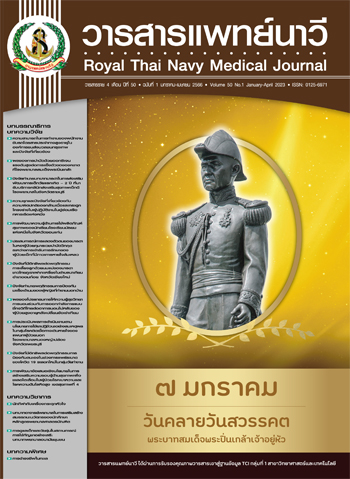Developing Knowledge about Using Health Products among Secondary School Students in Khon Kaen Province
Main Article Content
Abstract
This research and development project had the objective of studying the format and results of a training project to develop knowledge about the safe use of health products that was designed for adolescents and tested on secondary school students in Khon Kaen Province. For the design phase, input was gathered from 28 key informants. For the process of developing knowledge and assessment, the study relied on data from 34 students who were in grades 9 - 12. The tools used in the research consisted of a pre-test and a post-test before and after the training project, an activity recording form, and satisfaction assessment forms, which were used to collect both quantitative and qualitative data. The data collected were analyzed using descriptive statistics, inferential statistics such as dependent t-test, repeated measures Analysis of Variance, and qualitative data analysis.
The results were as follows: the format of the research-based knowledge development project that was created consisted of 1) improving knowledge of health products 2) improving practical skills by learning from practice and 3) improving skills through learning from undertaking the project. The results of knowledge improvement demonstrated that before model development, students had a mean knowledge score of 9.88 (SD = 0.57) and after model development the students had a mean knowledge score of 15.24 (SD = 0.55), which had a statistically significant difference (p < .001).
The results of the evaluation on student knowledge improvement after 2 months of participation in the research showed that the sample group had a mean knowledge score of 20.56 (SD = 0.24) when differences of mean scores from all 3 tests were compared by using the repeated analysis of variance statistics. The three knowledge scores differed with statistical significance (p < .0001). Comparing in pairs, mean knowledge scores before and after the project were different to a statistically significant degree (p < .001). The mean pre-test and post-test scores differed by 5.35 points (95% CI: 4.24 - 6.47) and the score before model development was statistically different from that after the second development (p < .001) by 10.68 points (95% CI: 9.54 - 11.81). The mean scores after development, when measured the first time and measured again at the second time, differed to a statistically significant degree (p < .001), and differed by 5.32 points (95% CI: 4.18 - 6.47). After completion, 52.9% of students reported that they were “very satisfied” with the project overall.
Article Details

This work is licensed under a Creative Commons Attribution-NonCommercial-NoDerivatives 4.0 International License.
References
Sumpradit N, Hunnangkul S, Phumart P, Prakongsai P. A survey of the antibiotic control and surveillance system and measures in promoting rational use of antibiotics: reliminary results. JHSR 2012;6(3):361-73. (in Thai).
Rachatanavin R. Prevalence of overt manifestation of steroid abuse without medical indication. [s.n.]; 2007. (in Thai).
Sommart J, Auiwattanakul P. Factors associated with antibiotic use among senior high school students in Khon Kaen. IJPS 2016;12(1):25-33. (in Thai).
Siam MHB, Imran A, Limon MBH, Zahid MH, Hossain MA, Siddique MA, et al. Antibiotic abuse: a cross-sectional study on knowledge, attitude, and behavior among the university students in Dhaka, Bangladesh. Electron J Gen Med 2021;18(3):em289. doi: https://doi.org/10.29333lejgmt10836.
System Development Group, Public and Consumer Affairs Division. Dietary supplements. Nonthaburi: Food and Drug Administration; 2007. (in Thai).
Singharannusorn C, Arunmuang A. Dietary supplement product consumption of secondary school students under Supervision Region 2 of Ministry of Public Health. TFDJ 2013;20(1):38-47. (in Thai).
Soongsathitanon K, Sitthiworanan C. Knowledge, attitude, informed perception and opinion of online cosmetic consumers toward consumer protection operations in Thailand. TFDJ 2020;27(3):78-89. (in Thai).
Food and Drug Administration, Ministry of Public Health. 4 decades of Food and Drug Administration. Nonthaburi: Food and Drug Administration; 2010. (in Thai).
Singhirunnusorn C. Knowledge and behavior on health product consumption of the secondary level student of Chainatpittayakom school, Chainat province. TFDJ 2012;19(1):25-34. (in Thai).
Pentongdee K. Development and evaluation of Or-Yor-Noi project to promote appropriate drug use in the community of Khamkhuenkaew, Yasothorn province. TFDJ 2012;19(2):69-77. (in Thai).
Blank W. Authentic instruction. In Blank WE, Harwell S, editors. Promising practices for connecting high school to the real world. Tampa, FL: University of South Florida; 1997.
Kaladee A. Prevalence and factors relating to the utilization of health products among students in a secondary school in Phuwiang district, Khon Kaenprovince. Thai Journal of Cardio-Thoracic Nursing 2022;33(1):50-66. (in Thai).
DiClemente RJ, Salazar LF, Crosby RA. Health behavior theory for public health: principles, foundations, and applications. 2nd ed. Burlington, Massachusetts: Jones & Bartlett Learning; 2019. p. 322.
Wongkumsin S, Singhwee C. Project-based learning for development self-directed learning. J of Soc Sci & Hum 2020;46(1):218-53. (in Thai).
Chow SC, Shao J, Wang H. Sample size calculation in clinical research. 2nd ed. Chapman & Hall/CRC; 2007.
Polsathorn W. The Participatory knowledge management using the A-I-C process in the operation of protection of consumers’ food and medicine products of family leaders in Phanompri district, Roi-Et province. [Master’s Thesis, Faculty of Public Health]. Mahasarakham University; 2011. (in Thai).
Kiatnitiprawat P. The development performance of community medical sciences model for consumer protection in Dong Kan Yai health promoting hospital. Kham Khuean Kaeo district, Yasothon province. [Master’s Thesis, Faculty of Public Health]. Mahasarakham University; 2012. (in Thai).
Ponsapsiri T. The development of consumer protection using community participation, Khueang Nai district, Ubon Ratchathani province. [Master’s Thesis, Faculty of Public Health]. Mahasarakham University; 2013. (in Thai).
Siriphan S, Srisawat Y. Student center: problem-based learning. Princess of Naradhiwas University Journal 2011;3(1):104-12. (in Thai).
Muendej S, Kaewurai R. Development of project-based learning model using social media to enhance creativity for junior high school students. Journal of Education Naresuan University 2020;22(2):182-92. (in Thai).
Choeisuwan V. Health literacy: concept and application for nursing practice. Royal Thai Navy Medical Journal 2017;44(5):183-97. (in Thai).


